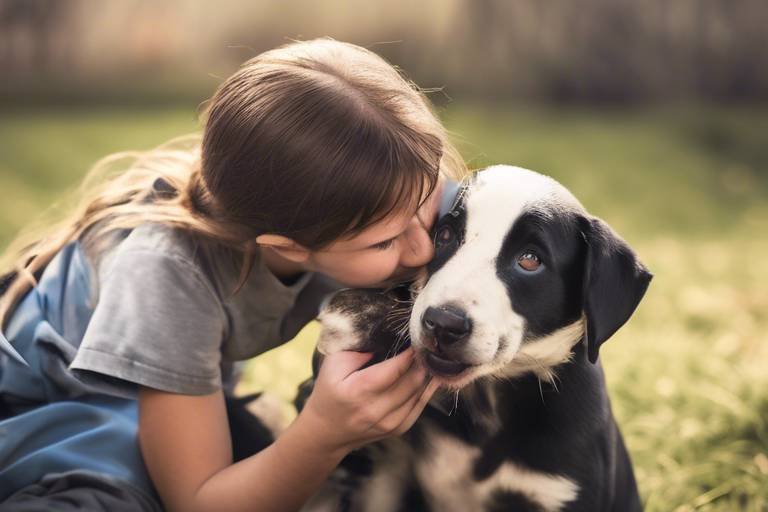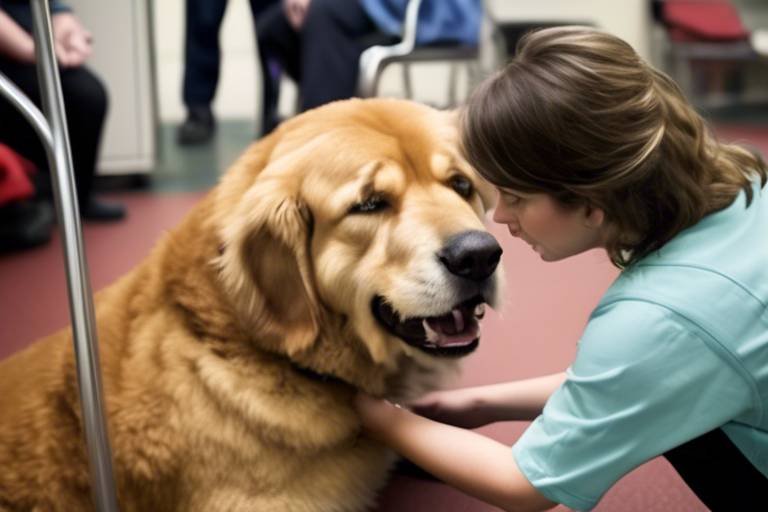How to Navigate Pet Adoption During a Crisis
Adopting a pet can be one of the most rewarding experiences in life, but when crises strike—be it a pandemic, economic downturn, or natural disaster—the landscape of pet adoption becomes more complex. During such challenging times, shelters may experience an influx of animals needing homes, while potential adopters might face heightened emotional and financial strain. This article aims to guide you through the intricacies of pet adoption during a crisis, ensuring that you make informed and responsible decisions. By considering emotional aspects, understanding the long-term commitment required, and utilizing available resources, you can navigate this journey with confidence and compassion.
Crises can significantly impact animal shelters and adoption rates. For instance, during a pandemic, many shelters have reported both an increase in the number of pets surrendered and a surge in adoption inquiries. However, the reality is that these organizations often face resource constraints, such as limited staff and financial support. As a potential adopter, it's essential to understand these dynamics. You might wonder, how can I help? By adopting responsibly, you're not just bringing a pet into your home; you're also supporting a system that is struggling to cope with an increased demand for services while trying to ensure the well-being of animals in their care.
Before diving headfirst into pet adoption, it’s crucial to evaluate your personal circumstances. Ask yourself: Are you ready for the responsibility? Your lifestyle, financial situation, and emotional readiness all play significant roles in determining if now is the right time to adopt. Remember, bringing a new furry friend into your home is not just a temporary decision; it’s a long-term commitment that requires careful consideration. Think about your daily routine, your work commitments, and how a pet would fit into your life.
One of the most significant aspects of pet ownership is the time commitment involved. Pets are not just cute companions; they are living beings that require daily attention and care. Consider how much time you can realistically dedicate to your new friend. Whether it’s taking them for walks, playing, or simply cuddling on the couch, pets thrive on interaction. If you have a busy schedule, you might want to rethink if this is the right time for you to adopt.
Daily care tasks for pets can vary depending on the type of animal you choose. Here’s a quick breakdown of what you can expect:
- Feeding: Depending on the pet, this could mean providing meals once or twice a day, ensuring they have fresh water at all times.
- Exercise: Dogs, for example, require regular walks and playtime, while cats may need interactive toys to keep them stimulated.
- Grooming: Regular grooming is essential, especially for long-haired breeds, to keep their coats healthy and free of mats.
Establishing a consistent routine not only benefits your pet but also helps you bond with them, creating a happy and healthy environment.
Adopting a pet is a long-term commitment that can last for years. It’s essential to consider how your life might change in the future. Will you be moving? Starting a new job? Having a family? Each of these factors can impact your ability to care for a pet. A pet relies on you not just for food and shelter but also for love and emotional support. Think of it like planting a tree; it takes time, care, and nurturing to grow strong and healthy.
Choosing the right pet is crucial for a successful adoption. Not all pets are the same, and understanding their unique needs can help you make a better decision. Factors to consider include:
- Breed Characteristics: Different breeds come with varying temperaments and care requirements.
- Energy Levels: Some pets require more exercise and playtime than others.
- Compatibility: Consider how a new pet will fit into your family dynamics, especially if you have children or other animals.
Taking the time to find the right match can lead to a fulfilling relationship that enriches both your life and the life of your new pet.
As you embark on your pet adoption journey, numerous resources can assist you. Local shelters, online platforms, and community programs are all valuable tools that can help facilitate responsible pet adoption during crises.
Connecting with local shelters and rescue organizations is a fantastic way to find your new companion. These organizations often have dedicated staff who can guide you through the adoption process, answer questions, and help you find a pet that suits your lifestyle. Don’t hesitate to reach out; they are there to help!
The rise of online adoption platforms has transformed the pet adoption landscape. With just a few clicks, you can browse through countless profiles of pets looking for homes. This technology not only makes it easier to find a pet from the comfort of your home but also enables shelters to reach a broader audience, increasing the chances of finding loving homes for their animals.
Q: What should I do if I have other pets at home?
A: It's essential to consider how your current pets will react to a new addition. Gradual introductions and ensuring everyone has their space can help ease the transition.
Q: How can I support my local shelter during a crisis?
A: Consider volunteering your time, making a donation, or spreading the word about their needs and available pets for adoption.
Q: What if I can’t adopt right now?
A: There are many ways to help without adopting. Fostering a pet, donating supplies, or even just sharing their posts on social media can make a significant difference.

Understanding the Current Landscape
In today's world, crises can take many forms, from economic downturns to natural disasters, and each has a ripple effect on various sectors, including animal welfare. When a crisis strikes, animal shelters often find themselves facing a surge in demand for pet adoptions while simultaneously grappling with resource constraints. This paradox can create a challenging environment for both the organizations and potential adopters. For instance, during the COVID-19 pandemic, many shelters experienced an influx of pets as people sought companionship during isolation. However, the same crisis also limited shelter operations, making it difficult for them to manage the increased number of animals needing homes.
Moreover, the emotional toll of a crisis can impact the decision-making process for potential adopters. Many individuals may feel overwhelmed by their circumstances and might not be in the right frame of mind to welcome a new pet into their lives. It's essential to understand that adopting a pet is not just about giving a home to an animal in need; it’s about making a commitment that lasts for years. During tough times, the responsibilities of pet ownership can feel even more daunting. Therefore, it’s crucial to assess not only the desire to adopt but also the practical implications of doing so.
As we navigate this complex landscape, we must also consider the role of community support and collaboration among shelters, rescue organizations, and potential adopters. Many shelters are adapting their strategies to better serve animals and people in need. For example, they might implement virtual meet-and-greets, online applications, and even foster programs that allow people to care for pets temporarily before making a long-term commitment. These adaptations are vital in ensuring that both pets and people can find their perfect matches, even during challenging times.
In summary, understanding the current landscape of pet adoption during a crisis requires a multifaceted approach. It’s about recognizing the challenges faced by shelters, the emotional state of potential adopters, and the innovative solutions being implemented to facilitate responsible adoptions. By being aware of these dynamics, we can make more informed decisions and ultimately create better outcomes for both pets and their future families.

Assessing Your Readiness for a Pet
Before you dive headfirst into the world of pet adoption, it’s essential to take a step back and assess your readiness for this significant commitment. Adopting a pet is not just about having a cute face to cuddle with; it’s about understanding that you’re bringing a living being into your home that requires love, attention, and care. So, let’s break down some key factors you should consider before making this life-changing decision.
First and foremost, take a good look at your lifestyle. Are you someone who travels frequently or works long hours? If so, you might want to rethink your readiness to adopt a pet. Pets thrive on routine and companionship, and they can feel lonely or anxious when left alone for extended periods. Think about your daily schedule and how a pet would fit into it. For instance, if you work a 9-to-5 job, can you dedicate time in the mornings and evenings for walks, playtime, and feeding? It’s crucial to ensure that you can provide the necessary time and attention your future furry friend will need.
Next, let’s talk about your financial situation. Owning a pet comes with its own set of expenses that go beyond the initial adoption fee. You’ll need to budget for food, grooming, routine veterinary visits, vaccinations, and potential emergency medical care. It’s like having a child; you need to be prepared for the unexpected. To give you an idea, here’s a simple breakdown of potential monthly expenses:
| Expense Category | Estimated Monthly Cost |
|---|---|
| Food | $30 - $100 |
| Grooming | $20 - $80 |
| Veterinary Care | $20 - $50 |
| Training Classes | $20 - $100 |
| Toys and Supplies | $10 - $50 |
As you can see, the costs can add up quickly. Make sure you have a solid financial plan in place so that you can provide for your pet without breaking the bank.
Lastly, let’s not overlook the emotional readiness aspect. Bringing a pet into your life can be incredibly rewarding, but it also requires a significant emotional investment. Are you prepared to deal with the ups and downs that come with pet ownership? Pets can get sick, have accidents, and sometimes display challenging behaviors. You’ll need to be patient and ready to provide the emotional support they need. It’s a two-way street; just as you’ll be providing love and care, your pet will also offer you companionship and joy. Ask yourself: are you ready to build that bond?
In summary, assessing your readiness for a pet involves a careful examination of your lifestyle, financial situation, and emotional preparedness. It’s not just about wanting a pet; it’s about being able to provide a loving, stable environment for them. If you find that you’re ready to take on this responsibility, then you’re on the right path to becoming a pet parent!
- How do I know if I'm ready for a pet? Assess your lifestyle, finances, and emotional readiness to ensure you can provide a stable home for a pet.
- What are the costs associated with pet ownership? Monthly expenses can include food, grooming, veterinary care, training, and supplies.
- Can I adopt a pet if I work full-time? Yes, but ensure you can provide adequate time for care and companionship, possibly considering pet sitters or dog walkers.
- What if my lifestyle changes after adopting a pet? Pets require long-term commitment, so consider potential lifestyle changes before adopting.
Time Commitment Considerations
When it comes to adopting a pet, one of the most critical factors to consider is the time commitment. Pets are not just cute companions; they require a significant amount of your time and energy. Think of it like having a toddler; they need constant attention, care, and supervision. Before you decide to bring a furry friend into your home, it’s essential to evaluate whether your current lifestyle can accommodate the needs of a pet.
First and foremost, let’s talk about the daily routines that come with pet ownership. Every day, your new pet will rely on you for feeding, exercise, and grooming. For example, dogs need to be walked regularly, often multiple times a day, while cats require less exercise but still need playtime and mental stimulation. Establishing a consistent routine is crucial to ensure your pet remains happy and healthy. Here’s a quick breakdown of daily care tasks:
| Task | Frequency | Time Required |
|---|---|---|
| Feeding | 2-3 times a day | 15-30 minutes |
| Walking (Dogs) | 2-3 times a day | 30-60 minutes |
| Playtime | Daily | 30 minutes |
| Grooming | Weekly | 1-2 hours |
As you can see from the table above, the time required can quickly add up. So, ask yourself: do you have the time to commit to these daily tasks? If you’re someone with a busy lifestyle, it might be worth reconsidering whether now is the right time to adopt a pet.
Additionally, adopting a pet is not just about the daily care; it’s about a long-term commitment that spans years. Pets can live for a decade or more, and during that time, your life circumstances may change. You might get a new job, move to a different city, or start a family. Each of these changes can affect your availability and ability to care for your pet. It’s essential to think about how your future plans align with the needs of a pet.
In conclusion, adopting a pet is a beautiful journey filled with love and companionship, but it comes with its share of responsibilities. Make sure you’re ready to dedicate the necessary time to give your new furry friend the life they deserve. It’s not just about the here and now; it’s about the long road ahead. Are you ready to embark on this journey?
- How much time should I expect to spend on pet care each day? - On average, you should plan for at least 1-2 hours daily for feeding, exercising, and grooming your pet.
- What if my schedule changes after I adopt? - It's important to have a plan in place, such as hiring a pet sitter or arranging for doggy daycare, if your schedule becomes more demanding.
- Can I adopt a pet if I work full-time? - Yes, but you need to ensure that you can provide adequate care, perhaps by adopting a pet that requires less daily attention or arranging for help when you are away.
Daily Care Needs
When you decide to welcome a furry friend into your home, it’s not just about the joy they bring; it’s also about the that come with pet ownership. Imagine having a new roommate who relies on you for everything—this is what having a pet feels like! From feeding to exercise, each day presents a new set of responsibilities that you must be prepared to tackle.
First and foremost, let’s talk about feeding. Just like humans, pets need a balanced diet to thrive. Depending on the type of pet you adopt, their dietary needs will vary significantly. For instance, dogs generally require high-quality kibble or wet food, while cats might thrive on a diet rich in protein. Establishing a feeding schedule is essential not only for their health but also for creating a routine. Most pets do well with two meals a day, but puppies and kittens may need more frequent feedings.
Next up is exercise. Pets are like kids—they have energy to burn! Regular exercise is crucial for their physical and mental well-being. Dogs, especially, need daily walks to expend energy and explore their surroundings. Depending on the breed, this could mean anywhere from a leisurely stroll around the block to an energetic hike in the woods. Cats, on the other hand, might not require walks, but they do enjoy playtime with toys that stimulate their hunting instincts. Keeping your pet active helps prevent behavioral issues and keeps them happy.
Another important aspect of daily care is grooming. Some pets require more grooming than others. For example, long-haired breeds might need daily brushing to prevent mats and tangles, while short-haired breeds may only need occasional brushing. Regular grooming not only keeps your pet looking their best but also allows you to check for any unusual signs of health issues, such as lumps or skin irritations. Establishing a grooming routine can also be a bonding experience for you and your pet.
In addition to these daily tasks, it’s important to create a safe and comfortable environment for your new pet. This means having a designated space for them with their bed, toys, and food and water bowls. Pets thrive on routine and familiarity, so setting up a cozy area will help them adjust to their new home more quickly. You might also consider pet-proofing your home by removing hazardous items and ensuring that all windows and doors are secure.
To sum it all up, caring for a pet is a rewarding journey filled with love and companionship. However, it’s essential to recognize that this journey comes with a set of daily responsibilities that require your commitment and attention. By understanding and fulfilling these daily care needs, you’ll not only ensure your pet’s happiness and health but also strengthen the bond between you and your new best friend.
- How often should I feed my pet? Most pets do well with two meals a day, but it can vary based on age and breed.
- What kind of exercise does my pet need? Dogs generally need daily walks, while cats enjoy playtime with toys.
- How can I groom my pet effectively? Regular brushing and occasional baths are key, depending on the breed.
- What should I include in my pet-proofing process? Remove hazardous items and secure windows and doors to keep your pet safe.
Long-Term Commitment
When you decide to adopt a pet, you’re not just bringing home a new furry friend; you’re making a that can last for years—sometimes even decades! It’s essential to understand that pets are not just a temporary source of joy; they are living beings that require ongoing care, love, and attention. Think of adopting a pet like planting a tree. You nurture it, water it, and ensure it grows strong and healthy; similarly, your pet will rely on you for its well-being and happiness.
Before you take the plunge, consider the following implications of pet ownership:
- Financial Responsibility: Pets come with a variety of costs, including food, veterinary care, grooming, and other supplies. Budgeting for these expenses is crucial.
- Life Changes: Your lifestyle may change over the years—new jobs, moving to a different city, or starting a family. Will your pet fit into these new scenarios?
- Emotional Support: Pets provide emotional companionship, but they also require emotional investment. Be prepared to offer love and support through their ups and downs.
It’s important to think about the long-term implications of pet ownership. For instance, many pets can live for 10 to 20 years or more, depending on the species. This means you’ll need to consider not just your current situation but also where you see yourself in the future. Are you ready to adapt your lifestyle to accommodate a pet? Are you prepared for the emotional highs and lows that come with pet ownership, including potential health issues or the inevitable passing of your beloved companion?
Moreover, pets thrive on routine. Establishing a consistent schedule for feeding, exercise, and playtime will not only help your pet feel secure but also strengthen the bond between you. Just like a child needs structure, your pet will benefit from knowing what to expect each day. This commitment to routine can be incredibly rewarding, as it fosters a sense of trust and companionship.
In summary, adopting a pet is a beautiful journey filled with love and joy, but it comes with responsibilities that last a lifetime. If you’re ready to embrace the long-term commitment, then you’re well on your way to creating a fulfilling life for both you and your new furry family member.
Here are some common questions that potential adopters often have:
- How long do pets typically live? The lifespan varies by species and breed. For example, dogs can live anywhere from 10 to 15 years, while cats often live into their late teens or even early twenties.
- What are the financial costs associated with pet ownership? Initial costs include adoption fees, vaccinations, and supplies. Ongoing costs can range from food and grooming to regular vet visits and emergency care.
- Can I travel with a pet? Yes, but it requires planning. Some pets can travel with you, while others may need to stay in a kennel or with a pet sitter.
- What if my lifestyle changes? It’s essential to consider how changes in your life, such as a new job or family, will affect your ability to care for your pet.
Finding the Right Match
Choosing the right pet is not just about picking a cute face; it's about finding a companion that fits seamlessly into your life. Think of it like matchmaking—just as you wouldn’t want to pair up with someone who has completely different interests or lifestyles, the same goes for pets. Each animal has its own personality, energy level, and needs, which means that the perfect match can make all the difference in both your lives.
First, consider the breed characteristics. Different breeds come with their own quirks and temperaments. For example, if you’re an active person who loves hiking, a high-energy breed like a Border Collie might be the perfect fit. On the other hand, if you prefer a more laid-back lifestyle, a gentle Bulldog or a relaxed Basset Hound could be more your speed. Understanding these traits can help you avoid the common pitfall of adopting a pet that doesn’t align with your lifestyle.
Next, think about energy levels. This is crucial because a pet with high energy needs can become a handful if you’re unable to meet their exercise requirements. Imagine bringing home a young Labrador Retriever only to find that you can barely keep up with their boundless enthusiasm! To help you gauge energy levels, consider the following:
- Active breeds: Require daily exercise and mental stimulation.
- Moderate breeds: Enjoy walks but also appreciate downtime.
- Low-energy breeds: Are content with short walks and lots of lounging.
Another factor to consider is your family dynamics. If you have young children or other pets, it’s vital to choose a pet that is known to be good with kids or compatible with other animals. Some dogs are naturally more tolerant and gentle, while others may not be as forgiving. Take the time to research and perhaps even meet potential pets to see how they interact with your family. Remember, a pet that fits well within your family dynamic can create a harmonious household.
Finally, don’t forget about the emotional connection. When you visit a shelter or rescue, spend some time with the animals. Pay attention to how you feel around them. Do you feel a spark? Does your heart race when you see a particular animal? Sometimes, the right match is about that indescribable connection that makes you feel like this pet was meant to be yours. Trust your instincts; they often guide you toward the right choice.
In summary, finding the right pet is a multifaceted process that involves understanding breed characteristics, energy levels, and family dynamics. By taking the time to assess these factors, you can ensure that your new furry friend will be a wonderful addition to your home and a cherished companion for years to come.
- What should I consider before adopting a pet? Evaluate your lifestyle, financial situation, and emotional readiness to ensure a successful adoption experience.
- How do I know if a pet is a good match for my family? Consider the pet's energy level, temperament, and compatibility with children or other pets.
- Can I adopt a pet online? Yes, many shelters and rescue organizations offer online adoption platforms, making it easier to find pets from the comfort of your home.

Exploring Adoption Resources
When it comes to adopting a pet, having access to the right resources can make all the difference. In times of crisis, many animal shelters and rescue organizations face increased demand and limited resources, which can complicate the adoption process. However, there are numerous avenues available for prospective pet owners to explore, ensuring that they find the perfect furry companion while also supporting their local communities. Understanding where to look for these resources can provide clarity and guidance during what can be an overwhelming time.
First and foremost, local shelters and rescue organizations are invaluable resources for anyone considering pet adoption. These facilities often have a wide variety of animals in need of homes, ranging from playful puppies to wise old cats. Many shelters also offer adoption events or special promotions to encourage responsible pet ownership during challenging times. Connecting with your local shelter can provide you with firsthand knowledge about the animals available for adoption, as well as insights into their personalities and needs. Moreover, shelter staff can assist you with any questions you might have about the adoption process, ensuring that you’re well-informed before making a commitment.
In addition to local shelters, online adoption platforms have surged in popularity, particularly in the wake of recent crises. These platforms allow potential adopters to browse a vast selection of pets from the comfort of their own homes. Websites like Petfinder and Adopt-a-Pet offer user-friendly interfaces where you can filter animals based on breed, size, age, and even location. This convenience not only saves time but also expands your options significantly. With just a few clicks, you can find pets that match your criteria and reach out to the respective shelters or rescues for more information.
Furthermore, community programs often play a crucial role in facilitating pet adoption. Many neighborhoods have organizations dedicated to promoting animal welfare, which may host adoption fairs or educational workshops about responsible pet ownership. These events not only connect potential adopters with animals in need but also offer valuable resources on pet care, training, and health. Participating in these community initiatives can also foster a sense of belonging and support among fellow animal lovers, making the adoption journey even more rewarding.
As you navigate the world of pet adoption, it’s essential to remain informed about the resources available to you. Whether you’re visiting a local shelter, exploring online platforms, or engaging with community programs, each option offers unique benefits that can enhance your adoption experience. By leveraging these resources, you’re not only increasing your chances of finding the right pet but also contributing to the welfare of animals in need.
- What should I consider before adopting a pet? It's important to assess your lifestyle, financial situation, and emotional readiness.
- How do I find local shelters? You can search online or check community boards for information on nearby animal shelters and rescue organizations.
- Are online adoption platforms reliable? Yes, many reputable shelters partner with these platforms to help find homes for pets.
- What resources are available for new pet owners? Many shelters offer post-adoption support, including training resources and advice on pet care.
Local Shelters and Rescues
When it comes to adopting a pet, local shelters and rescue organizations are often the heart and soul of the community. These places are not just facilities; they are sanctuaries for animals in need, filled with stories of hope and second chances. By choosing to adopt from a local shelter or rescue, you're not only giving a furry friend a loving home but also supporting a vital part of your community. Many shelters operate on limited budgets, relying heavily on donations and volunteers to care for the animals. Therefore, your choice to adopt can significantly impact the lives of both the pets and the people who dedicate their time to caring for them.
Connecting with local shelters can be an exciting journey. Most shelters have websites where you can view available pets, learn about their needs, and understand their backgrounds. Additionally, many shelters host adoption events that allow you to meet animals in person, providing a perfect opportunity to find that special connection. Imagine walking into a shelter and being greeted by wagging tails and purring cats, each one waiting for a chance to be part of your family. It’s an experience that can be both overwhelming and heartwarming. However, it’s essential to remember that adopting a pet is a commitment that goes beyond just the initial excitement.
Before visiting a shelter, it’s wise to do a little research. Most shelters will provide information about the animals’ temperaments, health histories, and any special needs they may have. This transparency helps ensure that you find a pet that matches your lifestyle. For instance, if you’re an active person, you might look for a high-energy dog that loves to go on hikes. Conversely, if you prefer a quieter home, a laid-back cat might be more your speed. By understanding the characteristics of different breeds and individual animals, you can make a more informed decision.
It’s also important to consider the role of local rescue groups. These organizations often focus on specific breeds or types of animals, offering a wealth of knowledge and resources for potential adopters. They usually have foster homes where animals receive care and socialization before being placed for adoption. This means that pets from rescue groups often come with a bit more background information, which can be incredibly beneficial for new owners. Plus, many rescues provide post-adoption support to help you adjust to life with your new pet, offering guidance on training and behavior.
In addition to the emotional rewards of adopting from a local shelter or rescue, there are practical benefits as well. Most shelters and rescues include spaying or neutering, vaccinations, and microchipping in their adoption fees. This can save you a significant amount of money and time, allowing you to focus on what truly matters: bonding with your new companion. It’s a win-win situation, as you’re providing a home for an animal in need while also receiving a pet that’s ready to join your family.
In conclusion, local shelters and rescues play an indispensable role in the pet adoption process. By taking the time to engage with these organizations, you can find a loving companion who will enrich your life for years to come. Remember, every pet deserves a chance, and by adopting, you’re making a profound difference in their world. So, why not take that leap? Your perfect furry friend might just be waiting for you at the local shelter!
Q: What should I bring when visiting a shelter?
A: It's a good idea to bring a valid ID, any necessary paperwork if you already have pets (like vaccination records), and a list of questions you may have about the animals.
Q: How can I support my local shelter besides adopting?
A: You can help by volunteering your time, donating supplies or funds, and spreading the word about their mission and adoptable pets.
Q: What if I adopt a pet and it doesn't fit well with my family?
A: Many shelters have return policies, allowing you to bring the pet back if it doesn’t work out. It’s essential to communicate with them about your concerns.
Online Adoption Platforms
In today's digital age, have revolutionized the way we find and adopt pets. No longer do you have to rely solely on local shelters or word-of-mouth; now, with just a few clicks, you can explore a vast array of furry companions waiting for a loving home. These platforms serve as a bridge between potential adopters and animals in need, offering a user-friendly interface that simplifies the adoption process. But what makes these platforms so appealing? Let’s dive into the myriad benefits they offer.
First off, the convenience factor is hard to beat. Imagine lounging on your couch, scrolling through adorable photos of pets from various shelters and rescues—all from the comfort of your home. You can filter your search by breed, size, age, and even temperament, making it easier to find a pet that fits seamlessly into your lifestyle. This level of accessibility is particularly crucial during crises when physical visits to shelters may not be feasible. With just a few taps, you can learn about a pet's history, personality, and specific needs, enabling you to make an informed decision.
Moreover, many online adoption platforms are designed to promote responsible pet ownership. They often include educational resources, such as articles and videos, that cover essential topics like pet care, training tips, and the emotional aspects of pet ownership. This is invaluable for first-time pet owners who may feel overwhelmed by the responsibilities that come with a new furry family member. Additionally, some platforms even offer virtual meet-and-greet sessions, allowing you to interact with the pet before making a commitment—what a fantastic way to ensure compatibility!
Another significant advantage is that these platforms often collaborate with multiple shelters and rescue organizations, broadening the selection of pets available for adoption. Instead of being limited to your local area, you can discover pets from various regions, increasing your chances of finding that perfect match. Some popular online adoption platforms include:
- Petfinder
- Adopt-a-Pet
- ASPCA's Adoption Portal
- Rescue Me
These platforms not only facilitate the adoption process but also play a crucial role in raising awareness about the importance of shelter pets. They often feature success stories and testimonials from happy adopters, which can inspire others to consider adopting rather than buying. This shift in mindset is essential, especially during challenging times when many animals are at risk of being overlooked.
However, while online platforms offer many benefits, it's essential to approach the adoption process with caution. Always ensure that the platform you choose is reputable and transparent about their practices. Look for reviews, check their affiliations with local shelters, and don't hesitate to ask questions. Remember, adopting a pet is a significant commitment that requires thorough consideration and preparation.
In conclusion, online adoption platforms are a game-changer in the world of pet adoption. They not only provide easy access to a wide variety of pets but also promote responsible ownership through education and support. So, if you're considering bringing a new furry friend into your life, these platforms might just be the perfect place to start your journey!
Q: How do I know if an online adoption platform is legitimate?
A: Look for platforms that have clear contact information, positive reviews, and affiliations with reputable animal shelters or rescue organizations. Transparency is key!
Q: Can I return a pet if it doesn't fit my lifestyle?
A: Most shelters and rescues have policies in place regarding returns. It's essential to read their adoption agreement and understand their terms before adopting.
Q: What should I consider before adopting a pet online?
A: Evaluate your lifestyle, financial situation, and emotional readiness. Ensure you have the time and resources to commit to a pet's care.
Frequently Asked Questions
- What should I consider before adopting a pet during a crisis?
Before diving into pet adoption, it’s essential to evaluate your lifestyle, financial situation, and emotional readiness. Ask yourself if you have the time and resources to care for a pet. Remember, adopting a pet is a long-term commitment, especially during challenging times when resources may be limited.
- How do crises affect animal shelters and adoption rates?
During crises, many animal shelters experience increased demand for adoptions while facing resource constraints. This can lead to overcrowding and heightened stress for the animals. Understanding this landscape can help you make informed decisions and support shelters in need.
- What kind of time commitment is involved in pet care?
Pet ownership requires a significant time commitment. Daily care tasks include feeding, exercise, grooming, and providing companionship. Establishing a consistent routine is crucial for your pet's happiness and health. Make sure you have the time to dedicate to these responsibilities.
- How can I find the right pet for my family?
Choosing the right pet involves considering factors like breed characteristics, energy levels, and compatibility with your family dynamics. It’s important to assess your household’s activity level and choose a pet that fits well within that environment to ensure a harmonious relationship.
- What resources are available for pet adoption?
There are numerous resources available for prospective adopters, including local shelters, rescue organizations, and online adoption platforms. These resources can provide valuable information and support throughout the adoption process, making it easier to find the perfect furry companion.
- How do online adoption platforms work?
Online adoption platforms have revolutionized the way people adopt pets. They allow you to browse available pets from the comfort of your home. You can filter by breed, size, and other characteristics, making it easier to find a pet that matches your lifestyle and preferences.



















